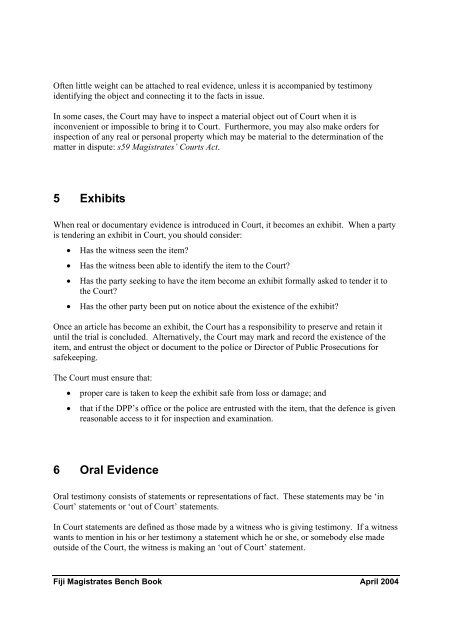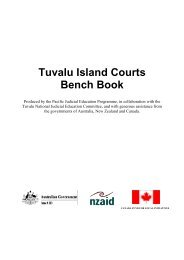Fiji Magistrates Bench Book - Federal Court of Australia
Fiji Magistrates Bench Book - Federal Court of Australia
Fiji Magistrates Bench Book - Federal Court of Australia
You also want an ePaper? Increase the reach of your titles
YUMPU automatically turns print PDFs into web optimized ePapers that Google loves.
Often little weight can be attached to real evidence, unless it is accompanied by testimony<br />
identifying the object and connecting it to the facts in issue.<br />
In some cases, the <strong>Court</strong> may have to inspect a material object out <strong>of</strong> <strong>Court</strong> when it is<br />
inconvenient or impossible to bring it to <strong>Court</strong>. Furthermore, you may also make orders for<br />
inspection <strong>of</strong> any real or personal property which may be material to the determination <strong>of</strong> the<br />
matter in dispute: s59 <strong>Magistrates</strong>’ <strong>Court</strong>s Act.<br />
5 Exhibits<br />
When real or documentary evidence is introduced in <strong>Court</strong>, it becomes an exhibit. When a party<br />
is tendering an exhibit in <strong>Court</strong>, you should consider:<br />
• Has the witness seen the item?<br />
• Has the witness been able to identify the item to the <strong>Court</strong>?<br />
• Has the party seeking to have the item become an exhibit formally asked to tender it to<br />
the <strong>Court</strong>?<br />
• Has the other party been put on notice about the existence <strong>of</strong> the exhibit?<br />
Once an article has become an exhibit, the <strong>Court</strong> has a responsibility to preserve and retain it<br />
until the trial is concluded. Alternatively, the <strong>Court</strong> may mark and record the existence <strong>of</strong> the<br />
item, and entrust the object or document to the police or Director <strong>of</strong> Public Prosecutions for<br />
safekeeping.<br />
The <strong>Court</strong> must ensure that:<br />
• proper care is taken to keep the exhibit safe from loss or damage; and<br />
• that if the DPP’s <strong>of</strong>fice or the police are entrusted with the item, that the defence is given<br />
reasonable access to it for inspection and examination.<br />
6 Oral Evidence<br />
Oral testimony consists <strong>of</strong> statements or representations <strong>of</strong> fact. These statements may be ‘in<br />
<strong>Court</strong>’ statements or ‘out <strong>of</strong> <strong>Court</strong>’ statements.<br />
In <strong>Court</strong> statements are defined as those made by a witness who is giving testimony. If a witness<br />
wants to mention in his or her testimony a statement which he or she, or somebody else made<br />
outside <strong>of</strong> the <strong>Court</strong>, the witness is making an ‘out <strong>of</strong> <strong>Court</strong>’ statement.<br />
<strong>Fiji</strong> <strong>Magistrates</strong> <strong>Bench</strong> <strong>Book</strong> April 2004
















